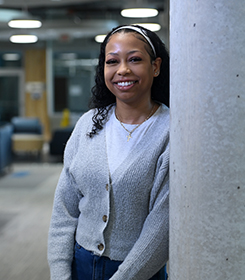This article is part of a series focusing on the grads of the ¬ť∂Ļ…Á Class of 2025. Spring Convocation takes place May 30 and from June 9-19 in Halifax and Truro. Read all our profilesŐżhere in one placeŐżas they are published.
This spring, ¬ť∂Ļ…Á marks a historic milestone as the first graduates of its Black and African Diaspora Studies (BAFD) major cross the Convocation stage.
As James Dixon and Portia Wright celebrate alongside family, friends, and the Dal community, they’ll walk not only for themselves, but for a program rooted in years of vision, advocacy, and community strength.
The major was heralded as a big step forward when it launched in fall 2023 as one of the first programs of its kind in Canada. The graduation of Dixon and Wright marks an important personal achievement, but it‚Äôs also a landmark moment for ¬ť∂Ļ…Á that will serve as a call to future scholars driven to explore Canada‚Äôs long-overlooked Black and African Nova Scotian history, heritage, and culture.
Meet James and Portia, the first of many BAFD scholars to come.
James Dixon, Arts and Social Sciences

James Dixon didn‚Äôt see much of a future for himself or a clear path towards success while in high school, so to be graduating from ¬ť∂Ļ…Á this spring with a double major in Black and African Diaspora Studies (BAFD) and Philosophy feels like a huge accomplishment.
After the death of a close friend in high school, James struggled but found strength in family, friends, and faith. Encouraged by a school advisor, he enrolled in Dal’s Transition Year Program (TYP).
‚ÄúHe saw something in me and believed TYP could give me a real chance,‚ÄĚ says James. ‚ÄúI found a sense of belonging there almost immediately. The classroom became a safe and inspiring space.‚ÄĚ
That year changed my life
He says many of the people he met in the TYP are still close friends and colleagues today. ‚ÄúThat year changed my life ‚ÄĒ and once I found my footing in the Faculty of Arts and Social Sciences, I kept building.‚ÄĚ
Finding home and purpose
James grew up primarily with his mother in Bedford, N.S., but spent a lot of time with his father and siblings in nearby North Preston. He recounts memories of living ‚Äėup home‚Äô as a kid, but most of his upbringing was shaped by life ‚Äėover town‚Äô with his mother in a single-parent household.
‚ÄúThat experience played a big role in how I‚Äôve come to understand identity, responsibility, and community,‚ÄĚ he says.
James explored different offerings in FASS, but it wasn’t until he started taking philosophy courses that he found a discipline that truly resonated with him and gave him the tools to think critically. Still, he struggled in some of the more rigidly Western-focused classes and began questioning his path.
It was right around the same time that Dr. Isaac Saney announced the launch of a major in the Black and African Diaspora Studies program, previously offered only as a minor.
It was like someone finally turned the lights on
‚ÄúIt was like someone finally turned the lights on,‚ÄĚ James says. ‚ÄúI immediately redeclared and took on the double major.‚ÄĚ
In those final years, he says he excelled academically, spiritually, and culturally.
A voice validated
 James‚Äôs academic progress was recognized this year when he learned an essay he‚Äôd written was selected as the winner of the 2025 Mushkat Memorial Essay Prize ‚ÄĒŐża contest within the FASS Essay Competition.
James‚Äôs academic progress was recognized this year when he learned an essay he‚Äôd written was selected as the winner of the 2025 Mushkat Memorial Essay Prize ‚ÄĒŐża contest within the FASS Essay Competition.
Őż‚ÄúThe Reality of Race: Critiquing Logical Positivism through the Lens of Africana Philosophy,‚ÄĚ a paper he had written for a philosophy class, earned him the $7,000 prize in a competition that initially felt like a longshot.
‚ÄúIt was personal, passionate, and academic all at once,‚ÄĚ says James, of his paper. ‚ÄúWhen I found out I‚Äôd been chosen, I was genuinely overwhelmed. It wasn‚Äôt just validation of the essay ‚ÄĒ it was validation of my voice, my intellect, and my right to be in spaces that often don‚Äôt expect us to thrive.‚ÄĚ
Scholar, artist, changemaker
Being one of the first two students ‚ÄĒ along with Portia Wright from the Faculty of Science ‚ÄĒ to graduate with a Black and African Diaspora Studies major is ‚Äúincredibly meaningful and deeply personal,‚ÄĚ says James.
‚ÄúFor Black students, it offers a space where we‚Äôre not just objects of study, but subjects with voices, agency, and lived wisdom. And for all students, it‚Äôs an opportunity to confront the gaps and silences that traditional disciplines often overlook. Studying BAFD doesn‚Äôt just make you smarter ‚ÄĒ it makes you more rooted, more aware, and more human.‚ÄĚ
He adds that the program didn’t just affirm his identity but also gave it depth and direction.
‚ÄúPortia and I are proof that this program matters ‚ÄĒ not just to us, but to every Black and African Nova Scotian student who deserves to see themselves reflected in what they study.‚ÄĚ
I want to stay connected to my community, continue speaking truth, and create platforms for others to do the same
In addition to finding his niche in academia, James balanced school with producing hip-hop and R&B music, working part-time jobs on campus as a tutor and mentor with the TYP, and off campus in the local restaurant industry. He also co-founded ‚ÄĒ a grassroots campaign raising funds for community initiatives.
‚ÄúBalancing all of it wasn‚Äôt always easy, but I learned how to view my time like currency,‚ÄĚ he says.
James plans to continue his charity work, explore graduate studies, and stay active in music and creative projects.
‚ÄúI want to stay connected to my community, continue speaking truth, and create platforms for others to do the same,‚ÄĚ he says. ‚ÄúWhatever comes next with the many doors I‚Äôve opened for myself, I know it will be grounded in purpose.‚ÄĚ
‚ÄĒ Genevieve MacIntyre
Portia Wright, Science

Though Portia Wright‚Äôs undergraduate journey did not begin at Dal, it will end with her crossing the ¬ť∂Ļ…Á Arts Centre stage as a milestone graduate with a double major in Black and African Diaspora Studies (BAFD) and Psychology uniquely suited to her future career plans.
Born and raised in Dartmouth with roots in the historic African Nova Scotian communities of Beechville, Lincolnville, and Africville, Portia ventured outside of the Halifax Regional Municipality to begin an undergraduate science degree but admits she didn’t feel at home.
‚ÄúThere were not a lot of Black students or a big Black community,‚ÄĚ she says of her first year. Portia opted to transfer to Dal for her second year, a decision that proved to be the right choice, both personally and academically.
I found the Black community at Dal was so welcoming
‚ÄúI found the Black community at Dal was so welcoming,‚ÄĚ she says, praising the opportunities available on campus and through the Faculty of Science. Over the summers, she worked with Black youth through and as lead counsellor with the long-running Black Educators Association‚Äôs ¬ť∂Ļ…Á Math Camp. The latter felt like a ‚Äúfull circle moment‚ÄĚ for Portia, who participated in the camp when she was 13.
Combining her passions
As a self-proclaimed ‚Äúsensitive person who is into discussing feelings and emotions,‚ÄĚ Portia knew in high school that she wanted to study psychology. Her discovery of BAFD, then available only as a minor, happened somewhat by accident after taking a course with Dr. Isaac Saney, who was in the process of developing the major.
‚ÄúIsaac was so passionate about the program that I felt I should at least look into it,‚ÄĚ she says.
 Though planning to focus on psychology, Portia realized she had already taken many of the courses required to major in BAFD when it launched in fall 2023, so a double major was possible. An added benefit was the freedom BAFD provided, compared to the more structured upper-year psychology courseload.
Though planning to focus on psychology, Portia realized she had already taken many of the courses required to major in BAFD when it launched in fall 2023, so a double major was possible. An added benefit was the freedom BAFD provided, compared to the more structured upper-year psychology courseload.
‚ÄúIt felt like I was taking classes I genuinely enjoyed that I could coincidentally make a major out of,‚ÄĚ she says, referencing courses like Philosophy and the Black Experience (PHIL 2165) and Philosophy of Race (PHIL 4700), both taught by Dr. Chike Jeffers.
‚ÄúThey really helped to stretch my thinking of what it means to be a Black person, what is race, how was the idea of race born, is it a tangible thing?‚ÄĚ
She recommends that any student looking for an elective consider taking a course in Black and African Diaspora Studies.
They really helped to stretch my thinking of what it means to be a Black person
‚ÄúThe things you learn are not just about African Nova Scotians or African Canadians. It covers so many issues that still exist to this day that deserve to have a light shined on them.‚ÄĚ
While psychology and BAFD represent very different subject areas, Portia feels both majors will complement her aspirations of becoming a counselling therapist, especially given her interest in working with Black youth.ŐżWhile she is graduating, she won‚Äôt be leaving Dal behind. She will begin a Bachelor of Social Work this fall.
Pushing to the finish line
Knowing she could be among Dal‚Äôs first BAFD graduates helped power Portia through the final year of her studies. ‚ÄúIt was a big motivator to push me toward the end of my degree,‚ÄĚ she says.
ŐżWith the hard work behind her, she is looking forward to experiencing Convocation with her friends and family, ‚Äúpeople who have known me since the very beginning of my journey and seen the highs and lows of my university career.‚ÄĚ
‚ÄúI‚Äôm excited to share the moment with them.‚ÄĚ
-Kenneth Conrad

